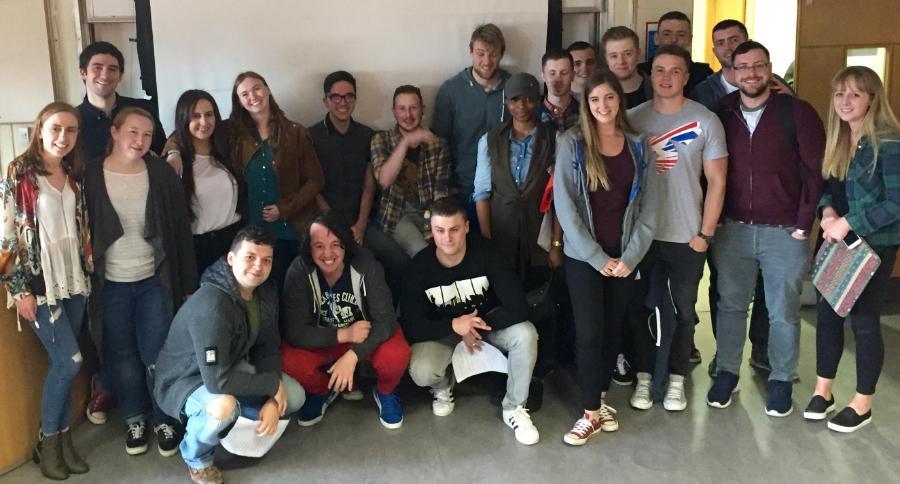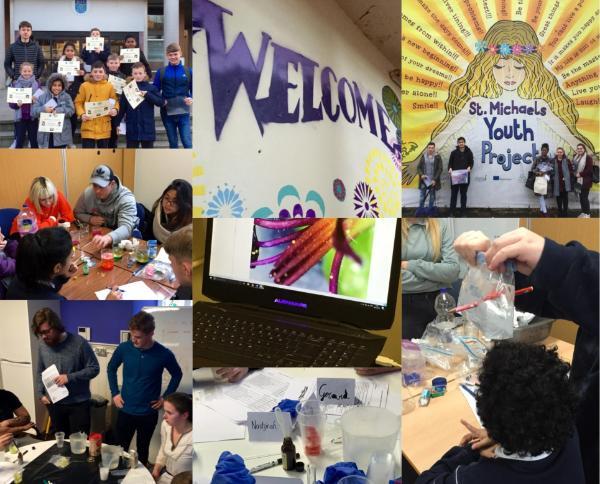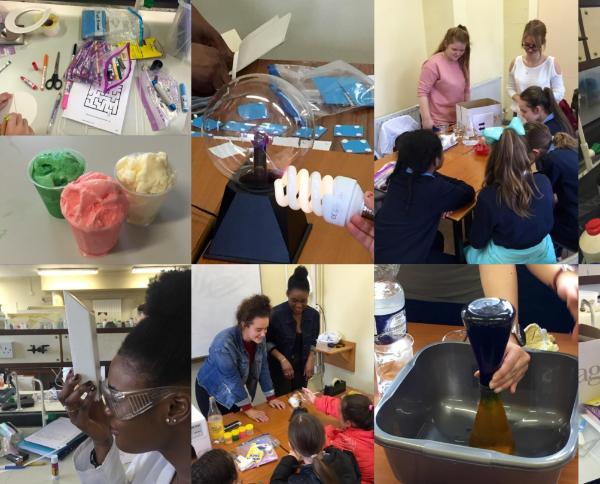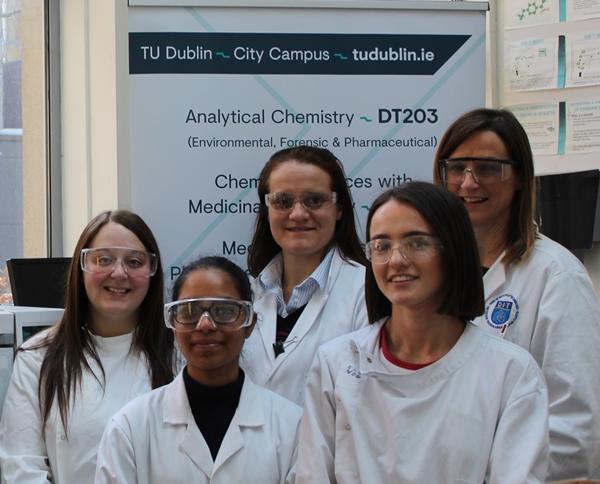Partnership
One of the key missions of the School of School of Chemical and BioPharmaceutical Sciences is to produce engaged, work-ready graduates. Partnerships with external bodies, including industrial, academic and community-based are vital to achieving this mission. Each Year the School places approximately 30 – 40 students nationally and 25-35 students internationally within Industry, state laboratories, regulatory bodies and research laboratories.
A six month work-placement in Ireland or an International (including ERASMUS) placement abroad in year 3 is core to all the level 8 programmes offered by the School. Our students are provided with experience in, and access to, a workplace or laboratory related to their core discipline.
Second year students on our level 7 programme are given the opportunity to take part in community based learning activities as part of their Professional Skills module. This allows students to apply academic skills and knowledge to a genuine community need, whilst building collaboration, critical thinking, organisation and communication skills.
Use the sections below to read more about partnerships with the School of Chemical and BioPharmaceutical Sciences.
On work-placement our students gain invaluable professional experience in the Pharmaceutical, Chemical and allied industries in positions, ranging from QC to QA in multinationals to SMEs. This integrated approach allows the student to build on their practical competencies and communication skills to function and perform effectively as a team member in the work place.
The employer has the opportunity to lift their profile with our student community. Work-placement students contribute to productivity allowing your fulltime staff to concentrate on core business activities. Initial investments in training and upskilling can be harvested over the 6-7 month period of the placement. The process can also assist employers in talent acquisition and workforce planning.
For further details contact Dr Ann Hopper, ann.hopper@tudublin.ie
Telephone: +353 1 2205564
For details of work placement students from the Pharmaceutical Science degree program please contact Maeve Scott. Maeve.Scott@TUDublin.ie
TU851 Analytical Chemistry(Forensic ,Environmental & Pharmaceutical)
TU852 Chemical Sciences with Medicinal Chemistry

The School of School of Chemical and BioPharmaceutical Sciences offers opportunities to individuals in the workplace to upgrade their qualifications to MSc and PhD by research. The aim of this initiative is to recognise the research and learning outputs from the workplace that contribute to new knowledge. TU Dublin can provide an opportunity to formally capture this research output through peer reviewed publications that can ultimately lead to a PhD by publication with direct academic support and guidance of a TU Dublin academic supervisor.
Alternatively, using a more conventional route, a research project that is a significant component of the work undertaken in a work setting, can be developed to form the basis of a PhD or MSc. This connected approach builds a bridge between professional practice and research and offers the industrial partner and opportunity to engage with academic experts in their area of interest.
Contact: Dr Patricia Ennis (patricia.ennis@tudublin.ie)
In addition, the School offers three taught MSc programmes designed to provide a bridge for students who have qualified in a science discipline to upskill to the specific requirements of the pharmaceutical and related industries. Further information is available in the Study section.
Community-Based Learning (sometimes called Service Learning or Community-Engaged Learning) is an approach which involves integrating classroom learning in any subject with a suitable volunteering activity, allowing students to apply their academic skills and knowledge to a genuine community need. The School of School of Chemical and BioPharmaceutical Sciences began to develop CBL activities in 2006 and has since rolled out projects with a wide variety of class groups and local community partners.
Staff in our School who are members of the Chemistry Education Research Team were recipients of one of the first national Disciplinary Excellence in Learning Teaching & Assessment (DELTA) Awards in 2018 and a significant feature of that application was our CBL activities.
Staff in the School of School of Chemical and BioPharmaceutical Sciences are currently working on the following projects:
Junior Scientist Badge with Core Youth Services in Inchicore
This project aims to develop a suitable syllabus for a Junior Scientist badge which will be adaptable for the 8 to 11 and the 12 to 14 age brackets. This outreach activity was designed to involve sustained interaction over a 5 week period with year 2 TU Dublin students (on the TU762 course) for young people aged 8 to 14 living in an underserved community, who have an interest in science and would like to work towards achieving the Junior Scientist badge. In order to gain their badge, the young people must complete the RSC Global Experiement and the Science Circuit with "stations" devised by TU Dublin students on a range of chemistry topics.
For more information on this project, contact Dr Vanessa Murphy (vanessa.murphy@tudublin.ie) or Dr Claire McDonnell (claire.mcdonnell@tudublin.ie).

A Slice of Science with the Presentation Primary School in Warrenmount
As part of this project, year 2 students from TU762 develop and deliver demonstrations and hands-on activities to 5th class pupils in the Presentation Primary School in Warrenmount. These activities are based on the curriculum areas of light and heat and enable the pupils to explore these concepts in an interactive and entertaining way. TU Dublin students also prepare videos of these experiments which can be used either by the primary school pupils or by others who may want to run similar sessions in their school.

Analysis of Pharmaceutical Samples from the Developing World
In 2018-9, we joined the Distributed Pharmaceutical Analysis Lab project run by Dr Marya Lieberman from the University of Notre Dame (UND). Analysis is performed to highlight counterfeit or below standard medicines sold in LMICs (lower to middle income countries) such as Kenya, Tanzania and Uganda. Local medical regulatory agencies are alerted if there is an issue and they conduct independent analysis and initiate any legal proceedings.
A range of dosage forms of the antibiotic azithromycin were analysed in 2018-9 by LC-MSMS & by HPLC by three undergraduate project students. Sarah Bliese (on left in the photo below) from UND visited our lab in March 2019.

For more information on this project, contact Dr Patrice Behan (patrice.behan@tudublin.ie).
Professional bodies are important in creating a chemical community which fosters collaboration and helps to advance excellence in the chemical sciences. Many of our staff and students are members of the Royal Society of Chemistry and the Institute of Chemistry of Ireland.
Our School has hosted numerous events on behalf of these professional bodies and our Head of Postgraduate Education, Professor John Cassidy, is a former President of the Institute of Chemistry of Ireland.
In addition to this, our Level 8 programmes (TU851 and TU852) have been recognised and accredited by the Royal Society of Chemistry and the Teaching Council of Ireland.
